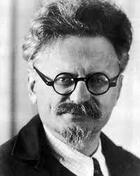
Lev Davídovich Bronstein (Russian: Лев Давидович Бронштейн, romanization Lyev Davídovich Bronshteyn) (Yánovka, Ukraine, October 26/July 7/November 7, 1879greg.-Mexico City, August 21, 1940), better known as Lev Trotsky (in Russian, Лев Тро́цкий, romanization Lyev Trótskiy, pronunciation About this sound /ˈlʲef ˈtrot͡skʲɪj/ (? i)) or, in Spanish, as Leon Trotsky, was a Russian politician and revolutionary of Jewish origin.
Although he initially sympathized with the Mensheviks and had ideological and personal disputes with Bolshevik leader Vladimir Lenin, Trotsky was one of the key organizers of the October Revolution, which allowed the Bolsheviks to seize power in November 1917 in Russia. During the ensuing civil war, he served as commissar for military affairs.
He negotiated Russia's withdrawal from World War I through the Peace of Brest-Litovsk. He was in charge of the creation of the Red Army that would definitively consolidate the revolutionary achievements overcoming poor support from foreign armies and the White armies during the Russian civil war; he was decorated with the Order of the Red Banner.
Later, he clashed politically and ideologically with Iósif Stalin, leading the leftist opposition, which caused his exile and subsequent assassination. After his exile from the Soviet Union, he was the leader of an international movement of the revolutionary left identified with the name of Trotskyism and characterized by the idea of "permanent revolution". In 1938, he founded the Fourth International.
He was assassinated in Mexico by Ramón Mercader, a Spanish agent of the Soviet NKVD, by order of Stalin.




